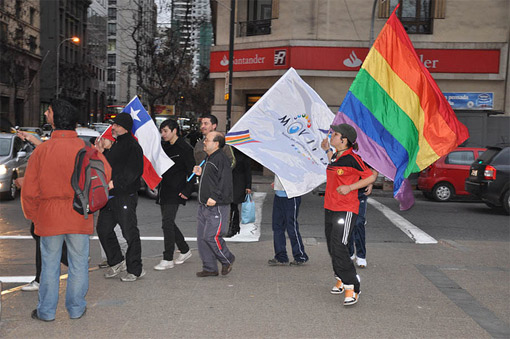Marriage equality for same-sex couples is gaining new momentum in the United States. One month ago, President Obama announced that “same-sex couples should be able to get married.” Meanwhile, major multinational corporations and top consumer brands are also coming out in favor of marriage equality. In February, Proposition 8, a voter referendum that reversed marriage legalization in California, was struck down by the United States Court of Appeals. And just one week ago, the part of the so-called Defense of Marriage Act that prohibits the federal government from recognizing same-sex marriages performed in states and countries where it’s legal, was nullified in a United States Court of Appeals ruling. Opinion polls show a majority of Americans, especially the younger population, believe marriage rights should be extended to same-sex couples.
Is this just a U.S. phenomenon, or are the rest of the Americas following a similar path?
The Americas are in the vanguard of marriage equality. Canada, Argentina, Mexico, and Brazil allow or recognize same-sex marriage either nationally or in specific localities. Combining those countries with the six U.S. states plus the District of Columbia that recognize same-sex marriage means that 434 million of 913 million people in the Americas—almost half of the population—live in countries or states that assure marriage equality. In July 2013, Colombia’s 46 million citizens will probably join the list: a 2011 Colombian Constitutional Court decision ordered the national congress to adopt legislation providing same-sex couples equal rights. Several additional jurisdictions—Ecuador, Uruguay, Brazil, French Guiana, Mérida (Venezuela), and Coahuila (Mexico)—have taken the half-measure of allowing or recognizing civil unions of same-sex couples.
However, the consensus toward marriage equality is not seen across our hemisphere. Chile, Peru, Bolivia, and Paraguay, along with Central America and the Caribbean, prohibit or do not recognize marriage, or any other form of protection for relationships, of same-sex couples.
In Chile, recent rulings from its Supreme Court (April 2012) and Constitutional Tribunal (November 2011) held that same-sex couples cannot get married in Chile, and if even legally wed elsewhere, they cannot even be married in Chile.
Secretary Clinton declared in Geneva last summer that gay rights are human rights, and human rights are gay rights. This is one reason why the Chilean rulings were denounced as human rights violations by the Movimiento de Integración y Liberación Homosexual (MOVILH), Chile’s largest and oldest lesbian, gay, bisexual, transgender, and intersex (LGBTI) rights organization. MOVILH filed a complaint on May 16, 2012 at the Inter-American Commission on Human Rights against Chile as part of its continuing struggle for the rights of LGBTI persons. It was only recently, following a March 2012 brutal bashing death of a young gay man, Daniel Zamudio-Vera, that Chile adopted a non-discrimination statute. Marriage isn’t even on the horizon; civil union legislation has stalled for years.
MOVILH’s petition is premised on the fact that marriage exclusion violates the American Convention on Human Rights, which guarantees equal protection of the laws, the right to found a family and the right to be free from religious discrimination. The petition seeks a ruling of the Inter-American Court of Human Rights that would require Chile and other countries to allow same-sex couples to get and be married.
MOVILH’s petition takes apart the arguments against marriage equality. Some arguments are based on preserving the status quo, a supposed marriage “tradition.” But many invidious traditions, like slavery, that rely on nothing more than tradition for their manifest oppression have been abandoned. Similar arguments are based on the supposed “definition” of marriage, but marriage has undergone significant redefinition over time, including granting property rights to women and legalizing divorce.
These arguments against same-sex marriage conceal their reliance on demonstrably false and damaging stereotypes such as the notion that LGBTI persons do not or cannot raise families like opposite-sex couples. At the same time, these arguments insist—contrary to all evidence—that legal marriage is inextricably tied to procreation. Such misconceptions falsely claim that same-sex couples cannot or do not have children or adopt them, and they overlook that many opposite-sex couples do not procreate.
Unmasking the opposition to marriage equality exposes only two coherent arguments for exclusion, both of which are incompatible with the American Convention on Human Rights. Many—but not all—religious views oppose marriage equality, but the issue is legal, not religious. Marriage is a legal license conferred by the state; it is a bundle of rights and duties and is a social status created by this legal support structure. Religious organizations may practice whatever they preach, but they are not free to make the state deny equal protection of the law or remove freedom of conscience to follow a different religious tradition that celebrates the love and commitment and supports the families of same-sex couples.
The ultimate argument for marriage exclusion is marginalization: it serves to denigrate, castigate or express disapproval of LGBTI people. It is effective at doing so, contributing to the kind of atmosphere that got a young Chilean gay man brutally murdered. It is anathema to decent, humane, equal treatment and respect for individuals’ freedom in creating the families they want to create without outside intrusion. It is a classic human rights violation.
For these reasons, it is time for Chileans—and people in Peru, Paraguay, Bolivia, and Central America and the Caribbean—to be able to live as the other three-fourths of the population of the Americas does—in a land of freedom, equality, and justice. President Obama famously declared he was “evolving” on the issue of same-sex marriage before announcing his support. He is not alone. Others are also evolving simply out of love and kindness; the gender of a couple does not affect their commitment to each other or to society.







